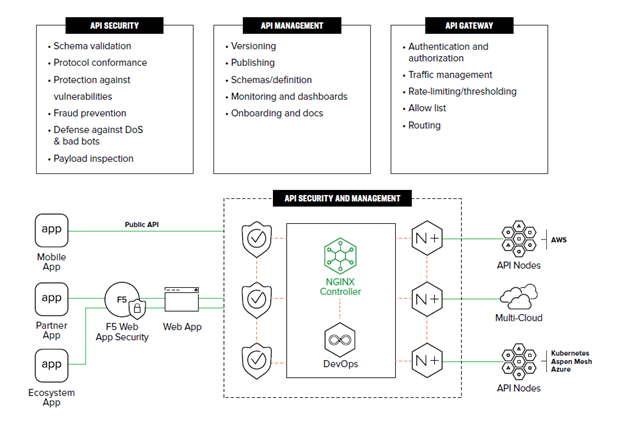Une approche moderne du secteur bancaire avec Red Hat OpenShift et F5
Les réglementations financières et le désir d’une plus grande concurrence et d’innovation rendent nécessaire l’élaboration de normes bancaires ouvertes. Vous connaissez probablement les avantages des fournisseurs tiers (TPP), comme les applications de paiement, qui permettent le mouvement d’argent entre les personnes en temps réel. Ce phénomène de ces dernières années visant à créer une manière transparente de transférer de l’argent d’une institution financière à une autre n’est qu’un exemple d’open banking, qui a conduit à tout un monde d’innovation dans le domaine des finances personnelles. En pratique, l'open banking signifie une grande variété de points de terminaison API exposés à ces solutions fintech TPP.
Passage aux API et au développement agile dans un monde bancaire ouvert
Le passage à un univers bancaire ouvert piloté par API s’accompagne de deux autres évolutions majeures dans le développement d’applications : l’adoption de processus agiles et la mise en œuvre d’applications à microservices. Nous utilisons une approche agile et moderne, en déployant des applications conteneurisées cloud natif dans des infrastructures cloud hybrides, couvrant à la fois des centres de données sur site et des clouds privés ou publics, avec une mise à l’échelle en temps réel. Nombre d’institutions bancaires et financières ont fait le choix de la principale plateforme Kubernetes cloud hybride, OpenShift. Red Hat OpenShift® Container Platform (PaaS conteneurisé) offre une plateforme open source d’entreprise, modulaire, évolutive et prête pour le cloud. Elle regroupe une large gamme de fonctionnalités pour concevoir et déployer des solutions conteneurisées ainsi qu’un portail complet de gestion PaaS, qui étendent ensemble la plateforme Kubernetes de base.
L'Open Banking offre de nouvelles solutions aux nouveaux marchés
Dans de nombreux cas, F5 et les équipes de compte Red Hat travaillaient déjà ensemble pour créer conjointement une solution conteneurisée évolutive et sécurisée afin de créer de nouvelles solutions (par exemple, la banque mobile) et d'ouvrir de nouveaux marchés (par exemple, l'Afrique du Nord). Les défis liés à l’open banking sont les mêmes. Les institutions traditionnelles répondent au besoin d’open banking et à la flexibilité et à l’évolutivité requises en adoptant Red Hat OpenShift.
Comment les technologies F5 contribuent à l'Open Banking :
- Offrez une sécurité centrée sur les API et protégez les API basées sur REST, ainsi que les API gRPC est-ouest, avec un pare-feu d'application Web (WAF), une terminaison SSL/TLS et des capacités de détection de robots, etc.
- Optimisez la gestion des conteneurs et activez l'évolutivité des déploiements de conteneurs au sein et entre les clusters OpenShift.
- Intégrez la sécurité et les performances dans les pipelines CI/CD grâce à l’automatisation de la sécurité.
- Améliorez la vitesse de votre activité en permettant l'automatisation des déploiements, de la gestion et des contrôles de sécurité approuvés des API.
Dans un article de blog précédent, James Lee, architecte de solutions F5, a expliqué comment les produits de sécurité F5 peuvent être utilisés en combinaison avec Ansible et OpenShift pour déployer une solution de sécurité automatisée qui répond aux menaces en temps réel. Un autre article de blog sur F5 DevCentral parlait de la protection des API dans un environnement Kubernetes. L’expérience nous a montré que les institutions financières choisissent massivement une solution de cloud hybride prise en charge comme OpenShift.
La sécurité et la rapidité des API sont les conditions préalables essentielles à tout déploiement d’open banking réussi. OpenShift est la plate-forme cloud hybride la plus largement déployée qui, en combinaison avec F5 Container Ingress Services (CIS) ou NGINX Ingress Controller, peut garantir que les déploiements d'applications bancaires ouvertes sont à la fois évolutifs et sécurisés.
